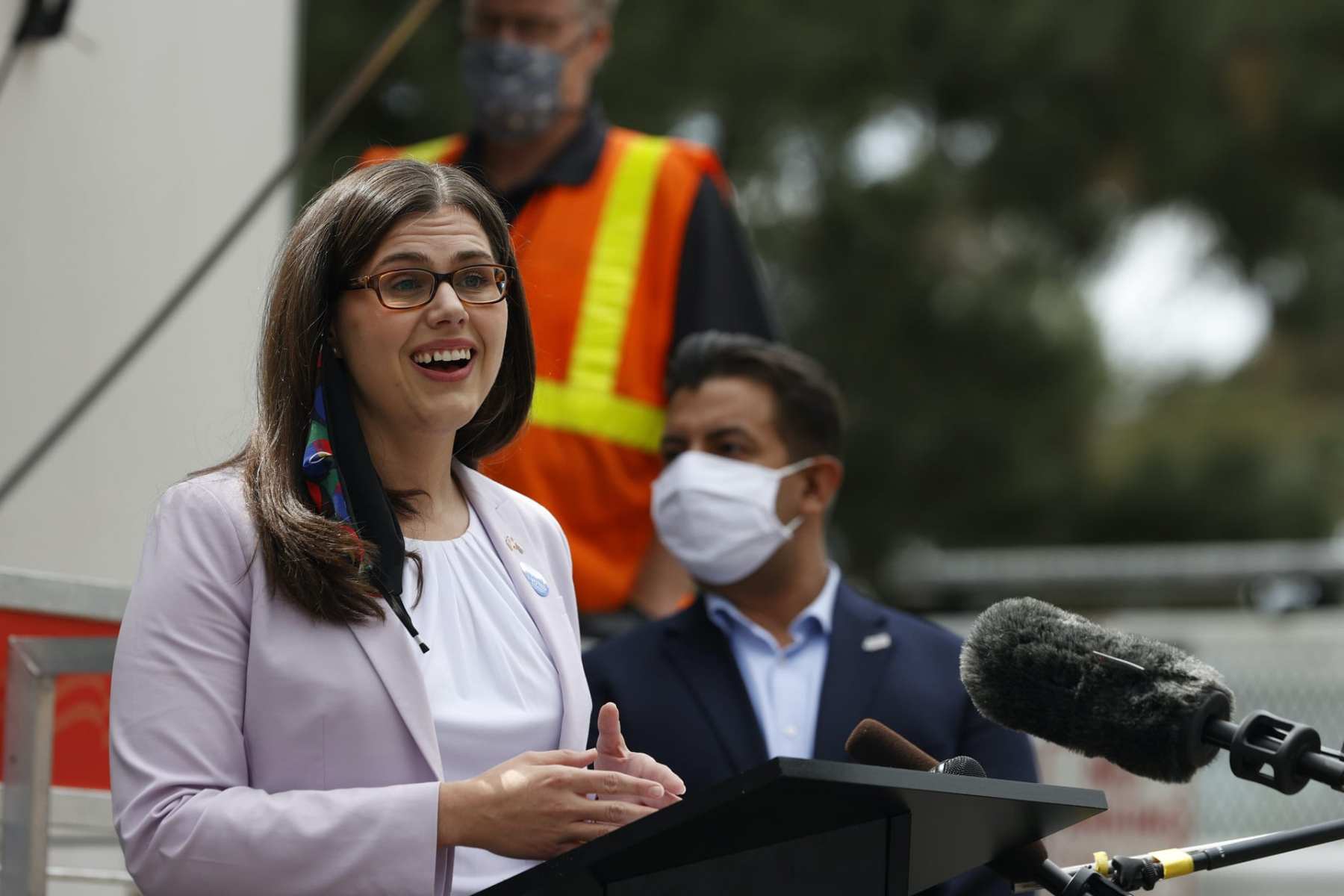Colorado is one of only a handful of states where residents vote primarily by mail. So as the pandemic struck the nation and other states expanded the option, elections officials turned to Jena Griswold, the Colorado secretary of state, for guidance.
Griswold, the top elections official in her state, has spoken vocally about why she believes strongly in a vote-by-mail system, which she says has expanded voter access in Colorado. Griswold — the youngest person serving in the state government role, which is still held predominately by men — spoke with The 19th about what other states can do ahead of Election Day, voter suppression and a new nickname she did not ask for.
This interview has been edited for length and clarity.
I understand that your staff privately has called you the “Dr. Fauci of vote-by-mail.” Why is that?
[Laughs] Who said that?
My understanding is some folks have called you that privately. Have you heard that?
I’ve heard it once or twice. It’s so funny that you’re saying that. You should ask them, but I actually asked someone who called me that… ‘How does that make sense?’ Their response, the person who said it to me, was, ‘You’re the person who is the trusted source of explaining how vote-by-mail should work.’
Elections officials in other states have turned to you for guidance this election cycle. What are they asking about, and what are you telling them?
I have spoken with a lot of secretaries of state, and our office is also working with election offices across the nation. Vote-by-mail, hands down, is the best voting model, especially during a pandemic, and I really want to see all Americans have the same type of access Coloradans have. So the conversations span. They develop as time goes by.
The initial conversations were really just like the nuts and bolts of setting up a vote-by-mail system. I’ve had conversations on how to ensure that voters can fix their signatures if there’s not a good match in the system. I’ve talked about the ways to track security on drop boxes. So you name it, we’re probably having a conversation about it. And it’s just been great to be able to work with secretaries from across the aisle on something that I think we really need as a country and is really important heading into November.
President Trump, without evidence, has claimed that a vote-by-mail system is unreliable. How do the president’s actions impact your work and that of other elections officials?
Well I do think that it’s incredibly troubling that the highest elected official in the nation is actively working to undermine our elections and our democracy. It does chip away at confidence, so it’s really important that election officials push back with facts. And that’s something that I’ve really tried to do. There are facts and lies, and we need to call them out. There are over 160,000 Americans who have died from COVID-19. There are over 5 million people who have contracted COVID-19. And the fact of it is that, unfortunately, it’s thousands and thousands of times more likely for an American to pass away from COVID-19 than [commit] any type of election fraud or double voting. So I do think the president should be focused on COVID-19 and saving this nation from a pandemic, and leave it to people like me and other election officials to advise what’s best for our nation’s elections. And especially, we shouldn’t be taking direction from someone who’s invited foreign interference into our elections, and that’s what the president has done.
The federal government has also made administrative decisions recently that, in some instances, have delayed the mail. How does that affect your advocacy for mail in voting?
There’s two things. I think the attack on the post office is just one of the ways that the federal administration is trying to suppress voters in November. Whether it’s lies about fraud in mail ballots, whether it’s lies about foreign interference with mail ballots, to the attacks on the post office. I can see a multi-pronged attack on our democracy.
With that said, I don’t think that we should be shrinking away from vote-by-mail. But I do think that the Colorado election model really illustrates some of the built-in contingencies that other states can look at.
So for example, we sent out our ballots, they’ll be going out October 9 to October 16. So that’s weeks before the actual election, so we have a built-in buffer. And then we actually asked Coloradans to stop sending them back about eight days before the election. Again, that’s a built-in buffer, so that if there are a couple days of slow down by the post office, our system will be able to handle it. One of the things that we use in Colorado is not only the return of mail ballots by the actual mail, but you can actually return a mail ballot by drop box. About 75 percent of voters using a mail ballot will return their ballot by drop box. And I have added, as secretary of state, hundreds of drop boxes across the state. We added the funding for 91 last year. And then I’ve announced that I’ll fund up to 100 additional ones this year. So states can also look to Colorado and look in to adding drop boxes. And then we also accept mail ballots at in-person polling centers.
So on that point, thinking like a voter, what do you say to someone who is trying to decide whether to vote by mail or to vote in person this year? And there’s also considering aspects like voting early in person or drop-off, like you mentioned.
We encourage Coloradans to vote by mail ballot to help stop the spread of COVID-19. Mail ballots are like wearing a mask: It’s one of the things that we can do to help protect frontline workers, help protect our neighbors and really combat the spread of this pandemic. So we fully, at this point, are urging Coloradans to use their mail ballots.
But it is also important to have in-person voting. And in Colorado, we have in-person voting and then same-day voter registration, where you can literally register to vote on Election Day and cast your ballot. And that in-person access is also important for folks who, for whatever reason, just did not receive their mail ballot or don’t want to vote-by-mail ballot. So we saw in our state primary, which by the way, had the highest turnout record in our state primary history, even during a pandemic. Our in-person voting options were still available but a lot, meaning 99.3 percent of Coloradans, used their mail ballot. The people we saw go vote in person, about 50 percent were younger than the age of 34. And if you think about, well, what are younger people doing? They’re moving a lot, their life is just a little less settled, most of the time. And so they deserve just as much of a right to cast a ballot than anybody else. So that’s why it’s so important to keep that in-person option.
States individualize their elections systems. Is there anything that you want top elections officials in America to do before, on or after Election Day?
There’s a couple things. So number one is just adopt vote-by-mail for all. It makes us more secure. Russia can’t hack a piece of paper. It increases accessibility.
We increased participation rates by 9 percent — including by 13 percent among Black voters, 10 percent among Latino voters and double-digits for younger voters. And it’s just also a fairer system. So having vote-by-mail, but also in-person voting access, will lead to high registration rates and high participation rates, and that’s what we show.
As the nation moves towards November, I think there’s a lot of things that different states and municipalities can learn from the Colorado election model. So for example, when it comes to the processing of ballots, we start processing those eight days before the Election Day. That’s something that the nation should do just to make sure that results are reported a little faster.
The president has very erroneously locked on to the concept that if election results are not posted on Election Day they’re invalid. Which by the way, election results are always unofficial on election night. You still have overseas and military ballots coming in. So his whole argument, it’s a lie and it doesn’t really make any sense.
But still, you know, if you can get ahead of the processing of ballots that’s a great thing. So I think that’s something the nation can do.
Just how concerned you are about foreign interference? It’s something you brought up a little bit earlier.
I’m immensely concerned about foreign interference. But there’s one really important distinction. So the president, one of the ways he has attacked vote-by-mail systems, is he said a foreign country can come in and replicate the ballot and basically steal the vote from Americans. And that is just conceptually dishonest. It would be extremely hard, if not impossible, to do. So the way he’s talking about foreign interference is not actually a risk of foreign interference.
But the idea that foreign governments are going to attack election infrastructure, or have ransomware attacks or try to suppress the vote through disinformation campaigns, that is a top concern. We know they’re going to interfere again, they’re already at it with disinformation campaigns. So I would say I’m incredibly concerned.
Are there any special considerations that you’re taking to deal with voter disinformation?
Colorado is one of the first states to monitor the dark web and social media for disinformation. A lot of secretaries of states’ offices do not have their own IT teams. We do. We have a 40-person IT and security team, always focused on our election infrastructure. And then I just created a new unit, it’s called the RESCU unit. And it’s focused on making sure that we have added support to work with counties, but also coming up with the newest strategies to combat cyber attacks and also disinformation. We were actually able to steal one of the top elections cybersecurity experts in the nation from the Department of Homeland Security. His name is Nathan Blumenthal, he’s leading this unit. We’re going to be building out strategies to combat disinformation and just add a lot more resources, because the folks at DHS, the civil servants, they’re excellent. But they have been obstructed. Their mission to protect our election infrastructure has been obstructed by Senator [Mitch] McConnell and the president. So states really need to lean in and lead when the federal government is not.
Obviously you can only speak for Colorado, but what are your thoughts about how to address concerns about voter suppression going into 2020?
That’s a great thing to highlight, especially on the heels of all the protests against the murder of Black Americans by the police. I do think the nation is becoming visibly aware to the degree of racial disparity and systematic racism. And I think it’s really important, as a secretary of state who is responsible for making sure that all communities have access, to really clearly state that voter suppression is systemic racism.
You just have to look toward Atlanta, to all the long lines we just saw on the heels of those protests of police brutality. And disproportionately, Black Americans were affected. So I am concerned about voter suppression. We have incredibly accessible elections in Colorado. And I will say, one of the tools to fight against voter suppression is vote-by-mail for all.
The second thing I would say on voter suppression, is that what we are seeing in 2020 is not within a bubble to itself. We have seen decades and decades of voter suppression and new strategies along the way. Fighting against the tool that allows voting accessible during the pandemic, which is mail ballots, is voter suppression. The fact that elected officials would close down in-person options or not make them safe, and then also not provide enough mail ballots, is voter suppression.






